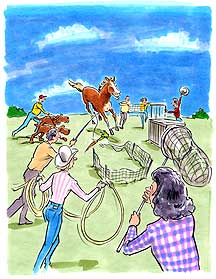 If your horse has run away in
a panic – perhaps there was a loud noise or even an injury – it may try to find
a place to hide, such as in a herd of other horses. You will need to approach
this horse quietly and cautiously. If you have ever seen a panicked horse, you
know how strong they are! Thus when securing your animal to an inanimate object,
such as a post, make sure that the items will be able to withstand the animal’s
pulling. Should you encounter your animal after it has panicked and also dragged
off whatever item you tied it to, you will need to employ special caution. First
and foremost you will need to gently disentangle the animal from whatever it may
be dragging with it. If the item is heavy, it will eventually fall off, but if
the item is light, then it might keep hitting the horse, making it run even
faster and more furious. While you are still able to walk the horse down, do not
approach it unless you absolutely certain how to handle such a panicked animal.
If you do not know for certain that you can handle this, then it is wisest to
get someone else to do this. If your horse has run away in
a panic – perhaps there was a loud noise or even an injury – it may try to find
a place to hide, such as in a herd of other horses. You will need to approach
this horse quietly and cautiously. If you have ever seen a panicked horse, you
know how strong they are! Thus when securing your animal to an inanimate object,
such as a post, make sure that the items will be able to withstand the animal’s
pulling. Should you encounter your animal after it has panicked and also dragged
off whatever item you tied it to, you will need to employ special caution. First
and foremost you will need to gently disentangle the animal from whatever it may
be dragging with it. If the item is heavy, it will eventually fall off, but if
the item is light, then it might keep hitting the horse, making it run even
faster and more furious. While you are still able to walk the horse down, do not
approach it unless you absolutely certain how to handle such a panicked animal.
If you do not know for certain that you can handle this, then it is wisest to
get someone else to do this.
Consider that while the animal is still at the height of fear, it is also quite
possibly has gotten injured and it will not take much to make it run again and
sustain further injury. If you will handle the horse, it is imperative to
ascertain which direction the animal will choose if it will once again run for
it. You must approach from the other direction to prevent getting entangled with
the object your horse may be dragging around if it runs. Generally speaking, an
animal will try to get away from an object that is attached to it. You will be
able to also observe this in the animal’s body language by taking a good look at
the direction in which the horse is leaning. Pick the spot from which the animal
will turn away if it should decide to make another run for it and then approach
it slowly.
Once you are able to approach, you will need to decide how to get the horse
untangled from the object it is dragging along. Is it attached to a bridle you
could just slip over its head? Is it attached to a lead rope that could be
quickly unsnapped? Look for any solution that is quick and requires the least
amount of patience on the part of the horse. Keep in mind that picking up the
dragged item is extremely dangerous and thus unwise. So take your time, approach
slowly, and plan your moves before you make them.
 |